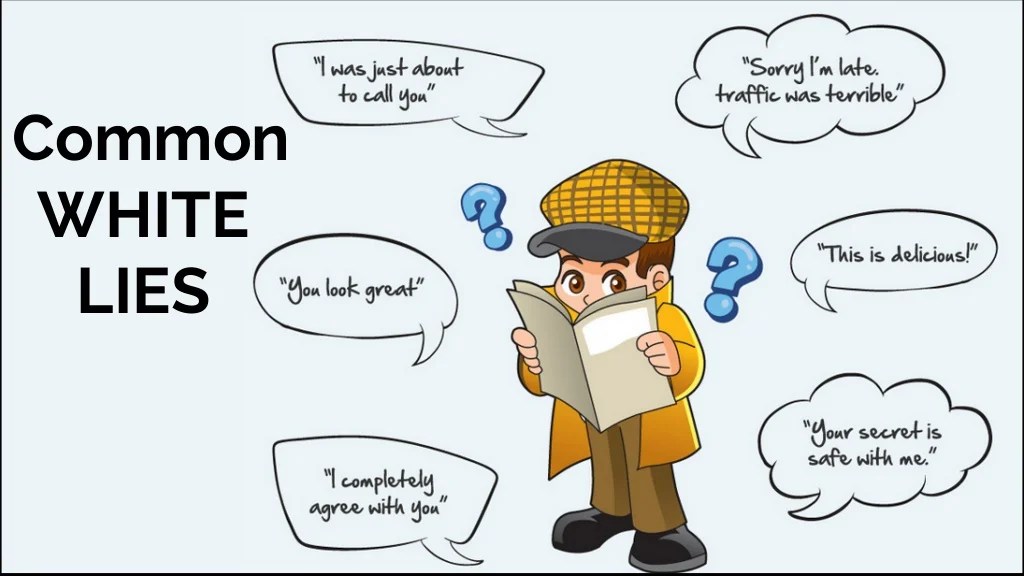Understanding White Lies: Examples And Their Impact
White lies are a fascinating aspect of human communication, often blurring the lines between honesty and deceit. These seemingly harmless fibs can serve various purposes, from protecting someone's feelings to avoiding awkward situations. In our daily interactions, we frequently encounter scenarios where telling the truth might lead to discomfort or conflict. White lies can be viewed as social lubricants, helping to maintain harmony in relationships. However, their implications can vary, and understanding the nature of white lies is essential for cultivating healthy communication habits.
As we delve into the world of white lies, it's important to recognize that not all lies are created equal. While a white lie may appear to be innocent or even benevolent, it can still lead to unintended consequences. The intent behind these lies often centers on kindness or consideration, but the ethical implications can provoke thought and discussion. In this article, we will explore various white lie examples, dissect their meanings, and examine the potential impact they have on our interactions.
From trivial fibs to more significant deceptions, the spectrum of white lies offers a wealth of insight into human behavior. By dissecting these examples, we can better understand the fine line we tread between honesty and the desire to protect others’ feelings. Join us as we navigate this intricate territory, uncovering the nuances of white lies and their role in our everyday lives.
What Are White Lies?
White lies are minor untruths told to avoid hurting someone’s feelings or to facilitate smoother social interactions. Unlike malicious lies intended to deceive for personal gain, white lies are typically benign and often well-meaning. They can manifest in various forms, such as compliments, reassurances, or omissions of truth. The key characteristic of a white lie is its intent to spare someone from discomfort rather than to cause harm.
Why Do People Tell White Lies?
There are several reasons why individuals resort to white lies, including:
- To protect feelings: Often, people tell white lies to avoid hurting someone’s emotions, such as complimenting an unappealing outfit.
- Avoiding conflict: White lies can help steer clear of disagreements or uncomfortable conversations.
- Social convenience: They can smooth over social interactions, making exchanges less awkward and more pleasant.
- Encouragement: Telling someone they did well in a task, even if they didn't, can motivate them to improve.
What Are Some Common White Lie Examples?
Here are some prevalent white lie examples that many people use in their daily lives:
- "You look great!" - Even if the person’s outfit isn’t flattering.
- "I’m busy that day." - To avoid an invitation without hurting the host’s feelings.
- "I love your new haircut!" - Even if it’s not to one’s taste.
- "I forgot my wallet." - To avoid paying for someone else’s meal.
Are White Lies Ever Justifiable?
The question of whether white lies are justifiable often depends on the context and intent behind them. Many people argue that if a white lie serves to protect someone’s feelings or maintain social harmony, it can be considered acceptable. However, others believe that honesty should prevail, regardless of the potential discomfort it may cause. Ultimately, the justification of a white lie comes down to individual values and the specific situation at hand.
How Do White Lies Affect Relationships?
White lies can have varying effects on relationships. In some cases, they can strengthen bonds by fostering a sense of support and empathy. However, if white lies become a habit, they might lead to trust issues or feelings of betrayal. It's crucial to strike a balance between honesty and tactfulness to ensure that relationships remain healthy and open.
Can White Lies Turn Into Bigger Lies?
One significant concern surrounding white lies is the potential for them to snowball into larger deceptions. When an individual tells a white lie, they may feel compelled to continue lying to maintain the façade. This can lead to a complicated web of dishonesty that ultimately undermines trust. Recognizing when a white lie is becoming too complex is essential to prevent further complications.
Real-Life Scenarios of White Lies
To illustrate the concept of white lies, we can look at real-life scenarios where individuals might resort to these minor untruths:
- Job Interviews: Candidates may exaggerate their skills or experiences to impress potential employers.
- Family Gatherings: Telling a relative that their cooking is delicious, even if it’s not, to avoid hurting their feelings.
- Friendship Dynamics: Avoiding the truth about not wanting to hang out with someone by claiming to be busy.
- Social Media: Curating a perfect online persona by sharing only the positive aspects of life.
What Are the Cultural Perspectives on White Lies?
Cultural norms significantly influence perspectives on white lies. In some cultures, honesty is highly valued, and even minor untruths may be frowned upon. In contrast, other societies may embrace the idea of white lies as a means of maintaining social harmony. Understanding these cultural differences highlights the complexity of communication styles across the globe.
Conclusion: Navigating the Fine Line of White Lies
In conclusion, white lies are an intricate part of human interaction that reflects our desire to protect others while navigating social norms. By examining various white lie examples, we can gain insight into the motivations behind these small untruths and their potential impact on relationships. As we strive for honesty and transparency in our interactions, it’s essential to consider the context and intent behind our words. Ultimately, the challenge lies in finding the right balance between kindness and honesty in our everyday lives.
Discovering The Enigma Of Angelskimi Age
Unveiling The Mystery Of Haley Pham's Race
Exploring The Exciting World Of Bring It On Movies

